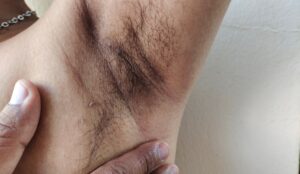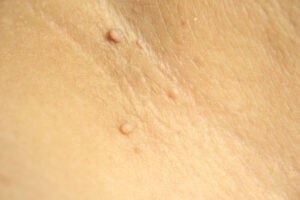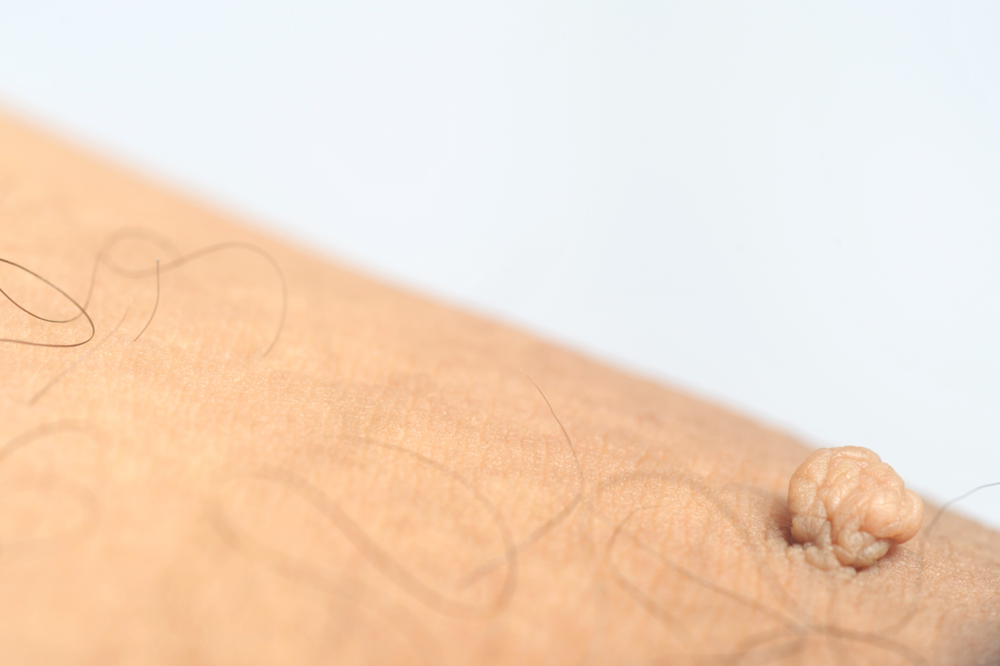What's the best option for skin tag removal?
We recommend sending us photos by email or completing our online consultation inquiry. Our nurse will talk to you about your best option for skin tag removal.
Please note: skin tag removal must be performed by a skin specialist, general practitioner or surgeon. This is imperative if your skin tag is in or around the delicate area of the eye or eyelid.
The skin tag may look like it could twist off but if you attempt this yourself you may cause bleeding, infection or scarring.
What is a skin tag?
Skin tags are little, benign growths that hang on the skin. They are common and usually soft and flesh-coloured or slightly darker. Mostly they will hang by a thin stalk. They are raised and can look knobbly, with a build up of skin. While skin tags are normally harmless they do have a blood supply connected to your body, so care needs to be taken when having them removed. Most often they will be in areas where skin rubs against itself or clothing and they are easily knocked. Commonly on the neck, underarms, groin or eyelids.

What causes a skin tag?
Skin tags are more likely to develop owing to:
- Age, as they're more common in middle-aged and older people
- Friction from clothing or skin folds
- Hormonal changes, such as during pregnancy
- Being overweight, because skin tags may form in skin folds
- Conditions like diabetes
- Genetics, as they can run in families.
When should you have a skin tag removed?
In most cases, skin tags have no health risks. But you may consider having one removed if it becomes irritated, bleeds or because you are constantly knocking it. Or it catches on clothing or jewellery or you simply don’t like the look of it. If your skin tag is near or on your eyelid, it may be annoying as you feel it when you blink or see it in your peripheral vision.
If your skin tag bleeds or changes in some way, for example, the colour changes, the feel of it changes or it grows, then it is time for it to be removed.
Contact us if you have concerns such as these about your skin tag or if you are not sure that it is in fact a skin tag and want a diagnosis to confirm. Contact us, too, if you just want it removed. Complete our online consultation inquiry and send us photos and our nurse will contact you to discuss the best options for treatment.

How we remove skin tags
Small skin tags can be shaved off with a sharp scalpel blade or frozen off with liquid nitrogen. If the skin tag is larger our surgeon will remove it under a local anaesthetic, where the skin tag and surrounding skin is numbed and then the skin tag is excised. You are awake during the procedure.
Usually, no sutures are needed and just a plaster will cover the small wound.
How long does skin tag removal take?
This is a quick procedure.
Skin tag removal typically takes 10-15 minutes, depending on the size of your skin tag and where it is on your body.
Check out our minor surgery pages for more information.
Can you fly long distance now you've had your veins treated?
This is another of our FAQs: when is it safe to fly long distance after my varicose vein treatment?
There are a number of factors to consider when embarking on long-distance travel after treatment, even by car. Domestically, we say it’s okay to travel straight away as long as you stop and walk around every 30 minutes for five minutes or so. Travelling overseas on a long-haul flight is more problematic.
It depends on what treatment you’ve had, whether you’re prone to blood clots (DVT, deep vein thrombosis) or have other medical conditions that increase your risk eg, being overweight or having reduced mobility. As well as your overall health. Keeping physically fit, not smoking and maintaining a healthy weight.

The reason all this is important is because you need to keep your circulation going and blood pumping back to your heart. Any long-distance travel carries a risk of blood clots, more so if you’ve recently had surgery, including a minimally invasive vein procedure. Cabin pressure and sitting for long periods may also cause your legs to swell.
Let us know your plans before your procedure so we can advise on when it’s safe to travel. We are also happy to see you after your trip for peace of mind.

We recommend waiting before travelling long distance
Usually we recommend waiting at least four to six weeks before flying long haul. Four weeks for Asia/US and six weeks for Europe. If you’ve had:
- Minor sclerotherapy: patients can fly short distances within three to seven days but for long-distance flights we recommend waiting two to four weeks to reduce the risk of blood clots.
- Minimally invasive varicose vein treatment: wait at least four to six weeks as above. Because the veins need time to heal and potential clot risks needs to be minimised.
- Below-knee compression stockings/socks should be worn with all air and road travel.
It’s been 4-6 weeks can I fly long distance now?
Even after waiting four to six weeks, we recommend the following during your flight:
- Wearing medical-grade compression stockings to promote blood flow and reduce the risk of swelling or clots.
- Moving around the cabin during the flight and doing seat exercises to help with circulation.
- Drinking water and avoiding alcohol; as alcohol dehydrates this can inhibit circulation.

If you have had a DVT before, talk to our vascular surgeon. He may recommend taking blood thinning medication.

